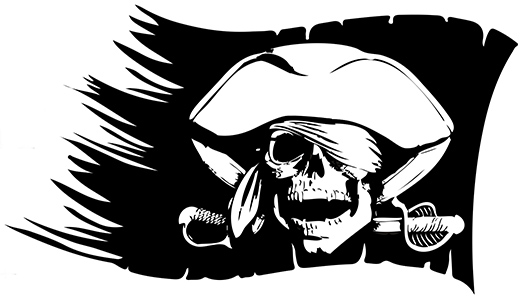Ttís hard to believe, but it is almost September 19, which means that Talk Like a Pirate Day is back. Another year has gone by the boards and in this monthís column, Iíll share with you the nautical origins of a few commonly-used phrases and expressions so you too can talk like a pirate, even if just for this one day.

By Captain Ray
Published: September, 2014
Tt’s hard to believe, but it is almost September 19, which means that Talk Like a Pirate Day is back. Another year has gone by the boards and in this month’s column, I’ll share with you the nautical origins of a few commonly-used phrases and expressions so you too can talk like a pirate, even if just for this one day.
Actually, I’ve given you one already, it the very first paragraph. Old time square-riggers were sailed downwind because they could not sail toward the wind very effectively. If something (or someone) fell overboard, once it was behind the ship it was no longer retrievable and was said to have “gone by the boards.”
Many non-boating people know the front of a boat is called the bow and the back the stern. But how many people know that the vertical timber forming the shape of the bow is called the stem, from the Anglo-Saxon “stefn” of the same meaning? This in turn has led to an expression meaning thorough or complete: “from stem to stern.”
When ordinary seamen were captured in wartime, they typically had to spend the rest of the war as a prisoner (or even as slave labor). Officers, however, received very different treatment. They were frequently paroled to live freely among their enemy hosts as long as they did not engage in hostile activities. They also were allowed to be ransomed or ransom themselves by paying a fee. From the Middle Ages on, this fee was set at one quarter of their yearly wage. When the ransom was not permitted in some unusual circumstances—and then by extension, when there was any especially harsh and cruel treatment of prisoners of war—it became known as “giving no quarter.”
Spanish sailors had a term “bonanza” that meant “to sail in good weather and with a fair wind.” This word was adopted by Yankee sailors, who broadened its meaning to include all forms of good fortune. The 49ers then picked up the word from the Yankee sailors as they made their way to the California goldfields, and they used it to describe a rich find. Eventually it even became a TV show.
The shipboard diet of the seaman was, to say the least, monotonous. One staple was boiled dried peas, which gave rise to the rhyme: “Peas porridge hot / Peas porridge cold / Peas porridge in the pot / Nine days old.”
Ships also carried barrels of salted meat, especially pork, and it was usually prepared by boiling of frying. As the voyage progressed, the grease from this meat (which sailors called “slush”) was saved. Once the vessel was back in port, the slush was sold. The monies thus collected were called a “slush fund” and were used to purchase small extras for the crew.
While on the subject of food aboard ship, meals were served on square wooden plates, and some claim this is the origin of the expression “a square meal.”
In the mid-1800s, the Royal Navy forbid wives from living with their husbands aboard ship. Until then, the practice was quite common while the ship was in port and even allowed sometimes when the ship was at sea. A couple would set up housekeeping under traps rigged between the great guns, and the inevitable offspring was called a “son of a gun.”
Ray Wichmann, is a US SAILING-certified Ocean Passagemaking Instructor, a US SAILING Master Instructor Trainer, and a member of US SAILING’s National Faculty. He holds a 100-Ton Master’s License, was a charter skipper in Hawai’i for 15 years, and has sailed on both coasts of the United States, in Mexico, the Caribbean and Greece. He is presently employed as the Master Instructor at OCSC Sailing in the Berkeley Marina.

